February 22nd, 2025 — movie reviews

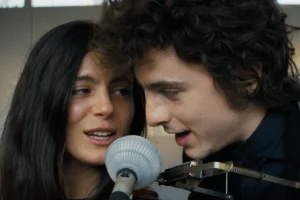
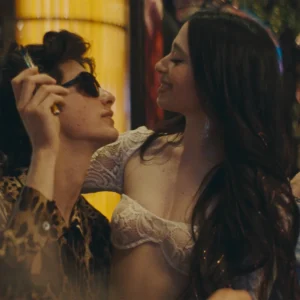
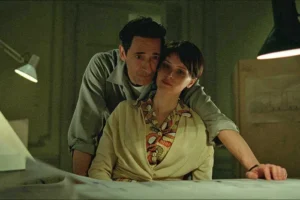


If Quentin Tarantino says movies have been All Done since 2019, then who am I to contradict him? For that matter, who are you? I only wish I’d said it before he had.
Oh, wait…I did. Maybe not exactly in his words. But I have for a while been saying in this space that the movies have been over going back at least a couple decades, if by “the movies,” you mean the process of theatrical releases shot, cut, dried and shipped fresh to as many exhibitors as can take them, the popcorn blockbusters and the rom-coms, the tentpole franchises and the scruffy horror knockoffs, those that are Searchlights and those that are…Everything Else. The COVID lockdown only accelerated a steep decline in the picture industry’s conventional way of doing business. Once-thriving multiplexes were vanishing from urban and suburban territories as far back as the second Bush administration, if not sooner, making the theaters of the present and foreseeable future boutique businesses.
Oddly enough, none of these transitions seems to have adversely affected the Academy Awards. They’re still a TV show and TV, obviously, rules the culture from stream to shining stream. Oscars are a reality show, above all, maybe the very first. And the objective of all reality shows as far back as “Candid Camera” is to catch people in the act of Being Themselves, even in a roomful of people whose expertise is to pretend to be Anything But – unless, of course, somebody gets mad enough to slap somebody silly. And that only happens once in a century. Unless we’re lucky…
This year’s show might be suspenseful enough without meaningless violence. If last year’s Oscars were mostly chalk, this year’s competitions are wide-open…with, maybe, one or two exceptions. The BAFTAs and trade awards have been little help in pre-determining this year’s winners since the choices seem to change with each show…again, with, maybe, one or two exceptions.
So, I’m guessing there’ll be some uncertainty leading up to March 2. The larger uncertainty, however, is the extent to which anybody besides movie buffs and industry people will care up to that point. That’s the thing with TV shows. Doesn’t matter what the reason is for them to be on. They need to get eyeballs above all else and the Golden Globes was smart enough to get Nikki Glazer at the peak of her post-Tom-Brady-celebrity-roast moment to host their shindig. No shade on Conan O’Brien, at least from this corner of the room. But has he told enough short people jokes lately to meet the stringent expectations of a bloodthirsty mass audience needing to Feel Seen?
After all this time, the Academy still doesn’t have the guts to let Kevin Hart host their show after all his movies have done for Hollywood. And you have to hand it to Hart because he…never mind. You know the rest.
As usual, predictions are in bold and, whenever I think it’s appropriate, amended with a FWIW (For Whatever It’s Worth) comment.
Another note, now that I’ve got these all written out: I’ve seen way too many of these damn things.
Best Picture
Anora
The Brutalist
A Complete Unknown
Conclave
Dune: Part Two
Emilia Pérez
I’m Still Here
Nickel Boys
The Substance
Wicked

Anora swept up the producers, directors, and writers guild awards in this category, so you’d have to believe it’s All Over, right? But remember that this is the AMPAS and I worry there’s too much T&A from the jump in this movie to rub some older voters the wrong way. Then I think: well, what does “older” mean in an Oscar voter these days? Sixty-something? Seventy-something? I’m 72 now and what my late mother and her sisters would consider “too sexy” or “too racy” isn’t all that “too” for my unapologetically boomer sensibilities. Granted, there are others in my demographic group who feel otherwise, but then there are likely fifty-somethings, or even forty-somethings among Academy voters for whom some of the sequences in Sean Baker’s contemporary fairy-tale-with-toads would be excessively sordid. Assuming that’s the case, where else would these votes go? Early on, it was plausible to believe that Brutalist, Conclave or Complete Unknown would have led the parade, being paradigmatically “prestigious” or “serious” productions.
Consider also that comedies haven’t often won for Best Picture since the 1930s, especially romcoms, (Annie Hall, you say? Maybe the one exception that really makes the rule.) So, at the risk of further spoiling my recent record on this category, I’m taking a shot on a dark horse, even if dark horses have an even poorer track record in this category than comedies. (For rare exceptions, see Crash. Or don’t.)
FWIW: But is Anora a comedy? That’s what everybody’s labeling it, even though I happen to think (and I don’t think I’m alone) that Baker’s story all-too-perfectly captures what those with an overabundance of money and power do to those who struggle to survive along the margins. Of the other candidates on this roster, Nickel Boys may be its closest analogue in this arrogance-of-power thematic context and RaMell Ross’s adaptation of Colson Whitehead’s Pulitzer-winning j’accuse is the most artistically daring of the nominees here. If I’d been an Oscar voter and Kamala Harris had won last November, Nickel Boys would have gotten my endorsement. But because the Other Guy got his ticket punched again, I’d likely go for the one about the lap dancer from Brighton Beach who gets fucked (over) by a Russian oligarch prince. Gruesome as Nickel Boys’ true-life horrors were, at least there was a glint of hope at the end, however belated.
Also: You’d have thought, especially at the outset, that the two musicals on this roster would have garnered much more attention and anticipation by now because they’re, you know, musicals. Emilia Pérez did get a lot of attention, though by no means was it the kind it wanted. As for Wicked, the general suspicion is that Oscar’s withholding its love until the second installment drops next year. Which makes almost as much sense as there being two installments in the first place. The exhibitors likely made this call since the idea of a four-hour-plus musical lumbering through the marketplace seemed illogical given America’s fast-shrinking attention spans, especially the teen-girl target demos. I’m in agreement with those who believe that attention spans in general have two settings: forty seconds and three-to-four hours with nothing whatsoever in between. It could’ve been done for Wicked. But it wasn’t. So those witches will have to wait. At least, one of them may anyway. (See further down.)
Best Director
Sean Baker, Anora
Brady Corbet, The Brutalist
James Mangold, A Complete Unknown
Jacques Audiard, Emilia Pérez
Coralie Fargeat, The Substance
For a while, this seemed Corbet’s to lose and, despite Baker’s DGA and PGA wins, I think he still could win. His unexpected BAFTA win suggests as much. There’s also a slight chance that Mangold could sneak in from behind, given the good will his movie’s sustained throughout the season. But I’ll follow the producers’ and directors’ leads on this, even with my earlier misgivings as to whether Baker’s movie is too racy to be Best Picture.
Best Actor
Adrien Brody, The Brutalist
Timothée Chalamet, A Complete Unknown
Colman Domingo, Sing Sing
Ralph Fiennes, Conclave
Sebastian Stan, The Apprentice
Brody has been securely in front of the pack since his movie’s premiere last fall and there’s been little, if any indication that he’s lost any ground to the competition. Meanwhile, there’s genuine affection out there for Fiennes and his performance, which is one of the slyest and wittiest on-screen turns he’s had in a while. And Chalamet continues to ride a wave of good feeling over his Dylan portrayal, withstanding months of sniping from odd corners about whether his rendering, and the movie’s, are “accurate,” whatever that means. Still thinking it’s Brody’s.

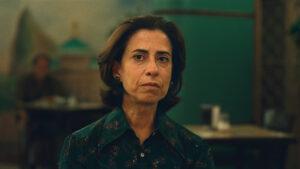
Best Actress
Cynthia Erivo, Wicked
Karla Sofía Gascón, Emilia Pérez
Mikey Madison, Anora
Demi Moore, The Substance
Fernanda Torres, I’m Still Here
Moore’s moving acceptance speech at the Globes helped raise her movie’s profile, making more people notice how much she went all out in a physically demanding – and distorting – role. The Academy loves it when attractive performers make themselves less attractive in whatever form and so this would seem locked up tight – except for Madison and Torres, the latter of whom has drawn rhapsodies from critics and audiences for her portrayal of a woman who lost her dissident husband in to a right-wing dictatorship in Brazil. Good as Madison is in her movie’s title role, the perception likely will be that her time will come sooner or later, leaving this to be pretty much a Moore-Torres duel to the end.
FWIW: As for Gascón, one wonders whether she’d still be in the hunt if those tweets about George Floyd, the pandemic, Muslims, and other volatile subjects from five years ago had never existed. Or, for that matter, if social media had never existed.

Best Supporting Actor
Yura Borisov, Anora
Kieran Culkin, A Real Pain
Edward Norton, A Complete Unknown
Guy Pearce, The Brutalist
Jeremy Strong, The Apprentice
An exceptionally strong field has been all but lapped by Culkin, whose performance is one of those ringers that dominate a movie so much that it may as well be a lead role but for the billing. Ignore those chirping sounds you’ve been hearing about Borisov being pulled ahead by Anora’s “momentum.” It doesn’t have that kind of pull and let me repeat, comedies don’t win Best Picture.
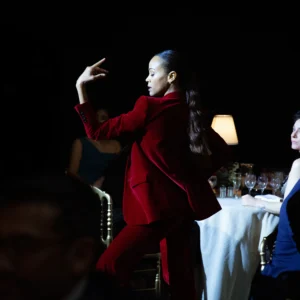
Best Supporting Actress
Monica Barbaro, A Complete Unknown
Ariana Grande, Wicked
Felicity Jones, The Brutalist
Isabella Rossellini, Conclave
Zoe Saldaña, Emilia Pérez
Apparently, Saldaña got through the voting process without the Gascón tweets spilling all over her prospects. If so, this signifies Hollywood showing its appreciation to her for her diligence and energy in and out of the MCU.
FWIW: Grande, however, remains a factor. For whatever reason, she’s the one Wicked principal who’s getting a big push for recognition right now as opposed to waiting till next year. And she’s genuinely magnetic and charming in the movie. No one should be surprised if waiting till next year isn’t the move here.

Best Adapted Screenplay
James Mangold and Jay Cocks, A Complete Unknown
Peter Straughan, Conclave
Jacques Audiard (in collaboration with Thomas Bidegain, Léa Mysius, and Nicolas Livecchi), Emilia Pérez
RaMell Ross and Joslyn Barnes, Nickel Boys
Clint Bentley and Greg Kwedar; Story by Clint Bentley, Greg Kwedar, Clarence Maclin, and John “Divine G” Whitfield, Sing Sing
If my prediction for a Best Picture upset is realized, Conclave wins this one, too. It may win anyway. But if recent history is any indication, glory in this category has gone to the bold and the Black, and so, I’m going here with my gut – and personal preference. Which aren’t always the same thing.
Best Original Screenplay
Sean Baker, Anora
Brady Corbet and Mona Fastvold, The Brutalist
Jesse Eisenberg, A Real Pain
Moritz Binder, Tim Fehlbaum, and Alex David, September 5
Coralie Fargeat, The Substance
Eisenberg’s excellent script notwithstanding, the WGA’s move should get seconded here.
Best Animated Feature
Flow
Inside Out 2
Memoir of a Snail
The Wild Robot
Wallace & Gromit: Vengeance Most Fowl
A superb field – with one clear winner, an immediate classic. As I’ve written elsewhere, you know a movie is great when, while watching it, you forget who, where and, at times (like this), even what you are. Flow is a great movie, pound for pound, the year’s best.

Best Documentary Feature
Black Box Diaries
No Other Land
Porcelain War
Soundtrack to a Coup D’état
Sugarcane
Against formidable odds, No Other Land, the collaborative portrait of Israeli journalist Yuval Abraham and Palestinian activist Basel Adra, has conducted a high-profile campaign for the Oscar despite its lack of a U.S. distributor, which has kept it virtually out of the running for trade awards. This is seen by pundits as an insurmountable handicap, though I’m going to make the archetypical leap-of-faith here and presume that surprises, if not necessarily miracles, can happen this year. The betting favorite, also hyper-charged with topicality, is Porcelain War, a much-decorated account of Ukrainian artists maintaining fidelity to their craft while doing what they can to resist Russian invaders. It’s a theme that sounds like an oozing honey tree for AMPAS voters. But what the hell, I’ll shoot the moon here.
Best International Feature
I’m Still Here
The Girl With the Needle
Emilia Pérez
The Seed of the Sacred Fig
Flow
Jacques Audiard’s musical gets its reward here, though as in the Best Actress competition, one shouldn’t underestimate the power of I’m Still Here’s theme. Especially these days. I’d pick Flow for a two-fer, but that’s (literally) just me.
Best Cinematography
The Brutalist
Dune: Part Two
Emilia Pérez
Maria
Nosferatu
Vistavision! Still big! Still bright!! Still somehow Brand New after lo these many years!! Lol Crawley’s got this one sewed up tight.
Best Original Score
The Brutalist
Conclave
Emilia Pérez
Wicked
The Wild Robot
The one qualm about Daniel Blumberg’s chances here is that voters in this category don’t often go for “experimental” composers or, for that matter, the “slabs of sound” approach that sounds as brutalist as the architecture under examination here. But the music is an evocative artifact on its own and too insinuating to ignore, or bypass.
Best Original Song
“El Mal,” Emilia Pérez (Music by Clément Ducol and Camille; Lyric by Clément Ducol, Camille and Jacques Audiard)
“The Journey,” The Six Triple Eight (Music and lyric by Diane Warren)
“Like a Bird,” Sing Sing (Music and Lyric by Abraham Alexander and Adrian Quesada)
“Mi Camino,” Emilia Pérez (Music and lyric by Camille and Clément Ducol)
“Never Too Late,” Elton John: Never Too Late (Music and lyric by Elton John, Brandi Carlile, Andrew Watt, and Bernie Taupin)
“El Mal” is a stunning performance piece, the whole of Emilia Pérez compressed into one three-and-a-half-minute rant/lament “Mi Camino” also benefits from Selena Gomez’s wistful enactment. I’d like to be wrong, but neither seems like the kind of song Hollywood goes for – and I’ve been burned on this category enough not to trust my inclinations towards the “cutting edge,” no matter who’s won what beforehand. I’m guessing Sir Elton gets another one of these for his mantlepiece, assuming he has one. (A mantlepiece, not an Oscar.)
January 24th, 2020 — movie reviews







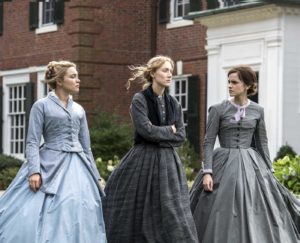
It will do no good to say, as we tend to do every year at about this time, that there are far more important things to think about than the damn Oscars. Of course there are. There always will be. The hum of impeachment hearings in the background as I’m writing this blog keeps pulling my attention away from such burning issues as whether Once Upon a Time…in Hollywood is better than Jackie Brown (not quite) or whether Charlize Theron’s impersonation of Megyn Kelly is as scary or as bravura as Renee Zellweger’s of Judy Garland. (A hard “yes.”) But here I am asking myself these questions anyway and you know why, don’t you? Because you can be entertained by senate hearings for only so long and we go to the gauze of Oscar because we need escape hatches from solemnity.
The troublesome part comes in gauging whether the media industrial complex now cares more about the Academy Awards than movies. Moving pictures come and go through whatever delivery system we can imagine and we still wont know for another ten years which of these movies will last, or what we’ll even mean when we talk about movies in 2030. I am sure that no one will remember or care who wins what in a couple weeks because none of you (I bet) will remember who won what a year ago.
I do know this: a borderline-exceptional year for movies yielded, as I wrote someplace else, one of the least exceptional list of Academy Award nominations in years. Not that the movies themselves are bad. Quite the contrary. But this was a year so filled with quality pictures that the Academy could have taken more chances, nominated less-expected-but-just-as-worthy movies and actors. We can delve deeper into the MIAs as we always do: with a For Whatever It’s Worth (FWIW) blurb, whenever and wherever applicable.
The competition, as depicted below, is pretty much coated with chalk; in sports terms, this means prohibitive favorites with apparently unimpeded rides to victory, especially in the acting categories…maybe.
What I’m also sensing from this year’s assortment is a (somewhat) reactionary bent from an academy that may have gotten (somewhat) fed up with the hoops it’s had to leap through over the previous decade on matters of diversity, independent films and streaming services. If there were a comic-book superhero movie successful enough to be worth the trouble, members might not only have nominated it, but given it several key awards just to spite the cinema snobs.
Oh wait. There is, in fact, a comic-book supervillain movie showing signs of doing exactly that on the evening of February 9th.
Zounds! That means this thing is bearing down on us harder than usual this season. So why wait any longer to get to the picks? The future, in more ways than one, is now.
Best Picture:
Ford v Ferrari
The Irishman
JoJo Rabbit
Joker
Little Women
Marriage Story
x-1917
Once Upon a Time in Hollywood
Parasite
Director:
Martin Scorsese The Irishman
Todd Phillips, Joker
Sam Mendes, 1917
Quentin Tarantino, Once Upon a Time in Hollywood
x-Bong Joon Ho, Parasite
The Irishman looked like an early favorite heading into the season. But the suspicion here is that, as with Marriage Story, there’s just too damn much Netflix around this stuff for movie traditionalists to come to terms with. Roma had the same problem last year, along with English subtitles. This latter aspect would seem to disqualify Parasite, though its overall popularity is far broader than Roma’s ever was. Something tells me that, of all the rest, 1917 is exactly what we think of when we think of “Oscar bait.” It has all the elements: a big-screen narrative far more suited to theatrical than living-room viewing; technical virtuosity in service to a grandly mounted tribute to The Human Spirit (plus it’s a truly absorbing ride); and it has Sam Mendes, who carries the kind of cachet of Serious Adult Film Director that Fred Zinnemann, William Wyler or David Lean used to carry into battles for Oscar, even though I happen to think he’s closer to Zinnemann than to the other two. That Mendes already has one of these (2000 for American Beauty) won’t necessarily keep him from getting another. Lately, however, the splits between best film and best director have happened more often than they used to, and Parasite has connected so hard and deep with all kinds of audiences living life in the 21st century’s global economy that it’s not inconceivable that its director will be honored individually for it, along with the all-but-inevitable Oscar the movie will receive for what they’re now calling “International Feature Film.”
FWIW: Just for the record, my favorite movie of 2019 was The Last Black Man in San Francisco, which is the very antithesis of whatever “Oscar bait” means. I also would have been OK with The Irishman or Once Upon a Time…in Hollywood winning the top prize. But those two, I think, were made for the longer haul of historic debate, not for Oscar’s ultimate approbation.
Lead Actor:
Antonio Banderas, Pain and Glory
Leonardo DiCaprio, Once Upon a Time in Hollywood
Adam Driver, Marriage Story
x-Joaquin Phoenix, Joker
Jonathan Pryce, The Two Popes
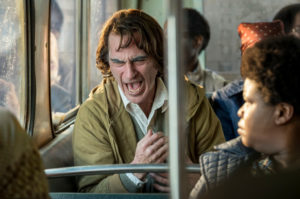
Phoenix has specialized in desperate, marginalized men driven to erratic, often explosive (mis)behavior. He once played somebody with those traits named “Joaquin Phoenix” who showed up on David Letterman’s couch seemingly intent on setting his career on fire. Here he’s perceived as having gone “all out” with this persona and there’s nothing Hollywood likes better than honoring performances perceived as being “all out” as opposed to just “out there.” It will do no good to maintain that he was better in Inherent Vice or even The Master because those characters just, you know, bothered people. As God’s Lonely Guy who became Batman’s nemesis, he’s made marginalization palatable, even tamer, by ramping up the pathos and making The Joker (or is it now just “Joker”?) a surrogate for all those who feel left out. Which is no small achievement – and destined for the Academy’s enshrinement.
FWIW: Of course, I preferred the quieter and thus more unsettling alienation afflicting Banderas’ aging artist in Pain and Glory. And however much I became annoyed with Driver’s younger, more mercurial artist in Marriage Story, I believed him to be much more an embodiment of the present-day zeitgeist than Phoenix’s prancing sociopath. But I’d much rather talk about Eddie Murphy’s noticeable absence from this list. What happened? Was Murphy’s Rudy Ray Moore not outrageous enough? Or would the Academy have been more wowed if he’d done his own spin on Moore’s Dolemite character? Maybe there simply wasn’t enough room for Murphy – or, it would seem, for anything else connected with Dolemite is My Name, which may not have been the year’s best, but was a better and more revelatory movie than Green Book. And while I understand Adam Sandler’s relief over not having to wear a tux for a few more nights, he should have been in this mix for his nitro-powered jitteriness in Uncut Gems.

Lead Actress:
Cynthia Erivo, Harriet
Scarlett Johansson, Marriage Story
Saoirse Ronan, Little Women
Charlize Theron, Bombshell
x-Renee Zelwegger, Judy
As with Phoenix, Zellweger is this year’s exemplar of a performer going “all out,” specifically in an eerily on-point evocation of a stage-and-screen legend in decline. Also as with Phoenix, pathos has a lot to contribute to her big lead — and she does all her own singing, too. It’s such a compelling turn that almost everything else about the movie blurs around it. And this could be a problem for her. She wouldn’t be the first star whose movie ultimately lets her down. (It seems a recurring liability in biopics.) Because of this as well as some shade being thrown on her movie by Garland’s daughter Liza Minnelli, Zellweger’s lead is the one most vulnerable to an upset – though one wonders if a Scarlett Johansson win would be much of an upset. Hers is the performance on this ballot that grows on you the most with its emotional variety and tonal progressions. And the fact that she’s under Academy inspection for another performance in another category could enhance her chances here. Hollywood worships Judy Garland and admires anybody willing to do her justice. But to take a cue from Sally Field, Hollywood likes, really likes Scar-Jo and could show her how much they do in this category – or even in the other one. But we’ll get there soon enough.

UPDATE (2/6) — Forget Marriage Story. Not at all as beloved in L.A. whose residents, I sense, feel somewhat dissed by their depiction. It’s Zelwegger after all.

Supporting Actor:
Tom Hanks, A Beautiful Day in the Neighborhood
Anthony Hopkins, The Two Popes
Al Pacino, The Irishman
Joe Pesci, The Irishman
x-Brad Pitt, Once Upon a Time in Hollywood
I hope Pitt appreciates the magnitude of his competition. All the other guys have won before and been nominated more often. The thing is: Pitt does appreciate it, which is what makes him as lovable among voters as Johansson. Then again, they liked Sylvester Stallone, too and Mark Rylance picked his pocket (deservedly so) four years ago in this category. The same thing could very well happen here as this is the one category where acting chops are given heavier weight than in others. (Pesci or even Hanks could be the beneficiary.) Pitt’s performance, however, is a marvel of subtle grace and containment, verities of terrific screen acting that never – or practically never – are honored by Oscar whenever they surface. I’m still going with Pitt, but I think his triumph here will be a bigger “upset” than most believe.
FWIW: Would Christian Bale or Matt Damon in Ford vs. Ferrari qualify here or for lead actor? Either way, I’d have been happy to see one or both in this board game along with Wesley Snipes in his sneaky-great eccentric turn in Dolemite.
Supporting Actress:
Kathy Bates, Richard Jewell
Laura Dern, Marriage Story
x-Scarlett Johansson, JoJo Rabbit
Florence Pugh, Little Women
Margot Robbie, Bombshell

Dern is Hollywood royalty and Hollywood’s been waiting for an opportunity to reward her years of daring and diligence. Though I think her harder-than-it-looks work in Little Women was what should have landed here, her icy, commanding divorce lawyer is likely very familiar to most Academy voters and the shock of recognition alone could be enough to power her to the winner’s circle.

FWIW: Then again, Johansson’s performance as single mom to a Nazi brat in JoJo Rabbit is, as critics have observed, the luminous soul of the movie and if she doesn’t upset Zellweger in the lead category, she could very well pull it off here. (UPDATE (2/6) — I’m now thinking she will.) As for MIAs, my one-and-only here is Idina Menzel as Adam Sandler’s taking-no-shit-and-giving-negative-fucks wife in Uncut Gems
Adapted Screenplay
The Irishman, Steven Zaillian
JoJo Rabbit, Taika Waititi
Joker, Todd Phillips, Scott Silver
Little Women, Greta Gerwig
The Two Popes, Anthony McCarthy
Here is where the consolation prizes are usually given for those movies otherwise overtaken elsewhere and it’s where I think Irishman avoids getting skunked for the night – though either Joker or JoJo could take it away.
FWIW: The case has been advanced — though not, in my opinion, made – that Gerwig’s interpretation of Louisa May Alcott’s book errs too much on the side of modernist, or even post-modernist thinking, robbing the story of the warmth and magic that has sustained it through several previous adaptations. I can’t believe that the Academy carries similar qualms, but I suppose it’s as good an excuse as any to wave her along. I hope in any case that I’m wrong about this.
UPDATE (2/2) — Whoops! The WGA has spoken and it done fell in love with JoJo. Nobody said a motherin’ word about Irishman or Joker or any of Those People. I’m going with them, though it’s by no means a mortal lock.
Original Screenplay:
Knives Out, Rian Johnson
Marriage Story, Noah Baumbach
1917, Sam Mendes and Krysty Wilson-Cairns
x-Once Upon a Time in Hollywood, Quentin Tarantino
Parasite, Bong Joon-ho, Jin Won Han
Another strong field, and the tendency as always is to go with the dude with the smartest, freshest mouth in the pack. Johnson’s crafty script is a dark horse. But here is yet another opportunity to gauge the degree to which Parasite has become a global phenomenon.
FWIW: OTOH, if 1917 gets this, the night is essentially over.
Animated Feature:
How to Train Your Dragon: The Hidden World
I Lost My Body
xKlaus
Missing Link
Toy Story 4
Jérémy Clapin’s odyssey of a disembodied hand in search of its owner was one of the most original films of any kind this past year. Of course, this means it hasn’t a chance in hell of overtaking Buzz and Woody’s latest adventures. Curiously, though, any of the remaining three contenders could.

UPDATE (1/27) — And if the shockeroo pulled off by the “Annies” the other night is any indication, it looks as though it’s going to be the St. Nick origin story.
Best Documentary Feature:
American Factory, Julia Rieichert, Steven Bognar
The Cave, Feras Fayyad
The Edge of Democracy, Petra Costa
For Sama, Waad Al-Kateab, Edward Watts
x-Honeyland, Tamara Kotevska, Ljubo Stefanov
Despite the Obamas’ enthusiastic endorsement, American Factory likely wont overtake the near-miraculously rendered account of Macedonian beekeepers in conflict over the future of their ancient trade – and in a larger sense, the future of the planet. That it’s also nominated in the category just below speaks to its preeminence.
Best International Feature Film:
Corpus Christi
Honeyland
Les Miserables
Pain and Glory
x-Parasite
Sorry, Maestro Almodóvar. But the South Korean juggernaut, as dark and wild as anything you’ve wrought in the past, is too strong for your masterly elegy to overpower.
FWIW: I was sort of hoping for some love here for Mati Diop’s haunting, allusive Atlantics.
Cinematography:
The Irishman
Joker
The Lighthouse
x-1917
Once Upon a Time in Hollywood
Robert Richardson’s orchestration of sunlight and shadow in Once Upon a Time… is invaluable in achieving a sense of a lost world that almost, but never, was. I’m rooting for him, but guessing that Roger Deakins will repeat a year after his long-denied first-time win.
Original Score:
Joker
Little Women
Marriage Story
1917
Star Wars: The Rise of Skywalker
Some hallowed names – John Williams, Alexandre Desplat, Randy Newman, Thomas Newman – are assembled here and they all showed up and produced big-time. Nevertheless it’s the relative newcomer — Hildur Guðnadóttir – who scores big on her first try.
Original Song:
“I Can’t Let You Throw Yourself Away,” Toy Story 4
x-“I’m Gonna Love Me Again,” Rocketman
“I’m Standing With You,” Breakthrough
“Into the Unknown,” Frozen 2
“Stand Up,” Harriet
If anybody is going to beat a drama-laden rouser from the Frozen machine, it’s Sir Elton, who even at or near his dotage can out-rouse anybody who throws down the spangled gauntlet.
December 31st, 2019 — movie reviews, on writing lit -- and unlit, TV reviews
Another year for people to hurry along into the dustbin – and the one just ahead doesn’t look at the outset to be much better, at least politically. But culturally at least, 2019 was a whole lot better than one comes to expect in Times Like These. So maybe pessimism about the immediate future is misplaced, though I’m keeping my cards hidden for now. Whatever the future holds, here once again is my own private top-ten of everything that got a rise out of me in the past year. And once again, they are in no particular order:

The Last Black Man in San Francisco – It’s been a long time since I’ve seen a movie three times in the same year, much less have it grow inside my head with each viewing. The first time I saw it, I came away thinking of it as a lyrical, idiosyncratic meditation on the cumulative impact on gentrification and the ways it has, over generations, shattered whatever meaning to be found in the words, “home” and “roots.” The second time I saw it, I listened closer to its dialogue, its depiction of families vulnerable to fault lines of denial, delusion and not-so-benign neglect. For whatever reason, the third viewing brought out in sharp relief the speech by budding playwright Montgomery Allen (Jonathan Majors) about the violent death of a friend and how whole lives, especially those belonging to young black men, are so often put in boxes by others and how it’s left to those young men to break out of those boxes by themselves. It made me think of boxes I’d been forced to occupy and bust open on my own throughout my life and, in the context of Joe Talbot’s debut feature, I started to wonder, with some distress, whether home, or even the desire for home, made up a kind of box that constrains one’s best aspirations. I bet if I watched it for a fourth, fifth and seventh time I’d start thinking of other, different things to unsettle me. No matter how many times I see it, the one line that’ll stay with me belongs, appropriately, to Jimmie Falls, the movie’s star and co-screenwriter, who gently chides a bus-riding sourpuss for bad-mouthing the home town that’s picked him up and slammed him down: “You don’t get to hate it, unless you love it.” Some movies are too small for the thoughts that contain them. But this movie has a soul big enough to set free hundreds of dreams, whether renovated or built from scratch.


Watchmen – “I’m not a Republic serial villain,” Adrian Veidt/Ozymandias insists in the original 1986-87 Alan Moore-Dave Gibbons graphic novel just before he makes millions of heads explode in New York City. Damon Lindelof’s sequel/reinvention for HBO made America’s heads explode by fashioning a harrowing version of a 1940s Republic movie serial spiked with sex, drugs and sociopolitical science. Among the many miracles of this brash and daring venture, the most noteworthy may be how it shares with its source material the way it weaves pulp mythology of costumed vigilantes into an oddly plausible version of 20th century history, leaving us all in pretty much the same sorry, disheartening mess we’re in at the precipice of true-life 2020. On a far less cosmic level, I have along with many others in the Twitter-verse found among many new reasons to love Regina King the way her character says “motherfucker” with the sweep and precision of a nothing-but-net three-pointer.

On The Media – I’ve long stopped watching nightly newscasts and would just as soon skip whatever the 24-hour news cycle has to offer at any given interval. But for the sake of whatever sanity I can maintain when dealing with the awfulness of the present, I never miss WNYC’s inquiry into all things media. Week after week, co-hosts Brooke Gladstone and Bob Garfield, along with their doughty support team of editors and producers, manage, with probing intelligence and gimlet-eyed scrutiny, to get at whatever’s been bothering me about the way things are and – mostly – aren’t covered by what we used to call “the press.” They are the go-to source for slicing and dicing though the smoggy mendacity of the Trump administration and its enablers. They secure your trust by chasing down truth, lies and, most of all, context. It isn’t enough, for instance, to say that the justice system is dysfunctional. So they will give you the historical factors – cultural, political and racial – behind mass incarceration. And not just that issue, but also poverty, climate change, education, foreign policy and housing. The program’s signature achievement in this especially estimable year was its series on “The Scarlet E,” as in “eviction,” one of many stories festering in post-Millennial America that doesn’t get as much attention in the media biosphere as, say, whatever Bill Gates is or isn’t doing with his money – even though they’ve got that covered like a blanket too. More than most of the media it holds accountable, this series fulfills the basic requirement for delivering the news by telling you things you didn’t already know and reminding you of things too important to forget.

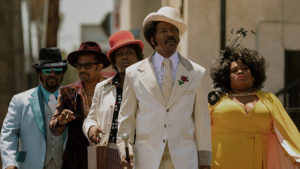
Once Upon a Time…in Hollywood & Dolemite is My Name – If I owned a repertory house or a drive-in, I would make these a double feature that I made sure to exhibit every year (late summer, I think). Though they’re set a few years apart from each other near the hinge of the 1960s and 1970s, both movies appear to be conversing from opposite ends of the culture about a transformative era for American movies. Traditions that were either falling apart or recombining in Quentin Tarantino’s iridescent alternate history of 1969 were pulled from back alley trash compactors by the working-class L.A. schemers and dreamers brought to merry life by director Craig Brewer and screenwriters Scott Alexander and Larry Karaszewski. The reinvention of Rudy Ray Moore (Eddie Murphy in what some keep insisting is a “comeback” even though he’s never really gone away) gives off a giddy vibe of a rags-to-raggedy-ass-riches saga, a kind of lounge-lizard’s version of Up From Slavery with an upraised middle finger goading you to eat its dust. Once Upon a Time…is in a starkly different manner a Pilgrim’s Progress saga, though you’re left wondering at the end whether it’s Leonardo DiCaprio’s has-been TV western hero or Brad Pitt’s deceptively blithe stuntman-handyman who’s made the most progress. Such questions matter more than whatever conclusions some have extracted from Tarantino’s vision – and it is more than anything a vision, whatever you want to make of its depictions of both imaginary and real-life characters.
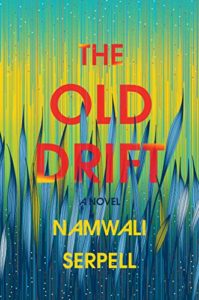
The Old Drift – My favorite novel of the year is best described by its author Namwali Serpell as “the great Zambian novel you didn’t know you were waiting for.” It begins with an implausible accident at the start of the 20th century involving three individuals in a hotel along the Zambezi River in what was then known as the Northwestern Rhodesia territory. The lives of their families – one African, one British, one Italian – are intertwined for what’s left of that century and for several years into the 21st. In between, there are sagas within sagas; some dealing with a woman’s hair that cannot stop growing and whose fallen strands make things grow out of the ground. Another story arc is based on the true-life effort by Zambia’s “Minister of Space Research” to train his newly independent nation’s best and brightest science students to beat both the Russians and Americans to the moon before the end of the 1960s. Eventually the tangled destinies of these and other characters are swept up by a public health calamity referred to here as “The Virus.” Serpell’s novel dares to imagine her native country into a technologically advanced near-future that is at once exhilarating and frightening in its prospects. Add to all this the constant presence of mosquitoes as both a kind of Greek chorus and vigilant corporate godhead and you have a willfully imaginative and (I almost forgot to add) gorgeously written contribution to the shelf of such novels as The Tin Drum, One Hundred Years of Solitude, Midnight’s Children and (wothehell) Adventures of Huckleberry Finn that realize a whole country’s heritage and destiny in a rich, capacious fictional narrative. I also forgot to mention that this is Serpell’s first novel.

Kristen Scott Thomas on Fleabag — There was a lot to love about the second season of Phoebe Waller-Bridge’s universally-acclaimed series, beginning (of course) with Waller-Bridge herself and her bemused, stressed-out and agreeably horny alter-ego stumbling and grappling through her fraught early thirties. I was all in on her Fleabag persona throughout her search for love, even if the approach-avoidance thing with The Priest (Andrew Scott) began to grate for reasons having nothing whatsoever to do with its presumptive “impropriety.” For all its humane and bittersweet wit, the series, for me, glowed brightest in the approximately five minutes Fleabag spends in a bar with Belinda (Thomas), a corporate mogul fleeing a cocktail party in her honor. Over martinis, Belinda gives Fleabag – and us – the gift of her wisdom about things like menopause, why women are better able to deal with pain than men and the categorical imperative to flirt. Never before have I (and, I’m betting, anybody else I know) seen Kristin Scott Thomas so juicy, so fired-up-funny and lit-from-within as she is here. No wonder Fleabag makes a pass at her. We all would. But instead of a tumble, Belinda bestows to Fleabag something more precious by declaring, “People are all we’ve got.” And in case you didn’t hear her, she repeats, “People. Are. All. We’ve. Got.” Much as you don’t want to agree (and almost everything else about the series encourages you not to), you know, deep down, that she’s right about this, along with everything else she’s laying down.

Rolling Thunder Revue: A Bob Dylan Story – A word to those who insist on believing that Martin Scorsese’s meta-mixing of imaginary sidebars to the actual Rolling Thunder tour conducted by Dylan during the Gerald Ford administration is somehow contiguous to the “fake news” ethos abetted by the Right. That word is, to be polite as possible about it, no. The movie states its business at the outset: what else would an old magic trick be doing there? If you can’t tell from jump street that it’s playing fair with its variations on a theme, that’s on you, not on Scorsese and not on Dylan. I may disagree with the latter’s typically gnomic pronouncement that wearing a mask is a means of telling the truth. (As with much else with Dylan, he borrowed that observation from someone else; Oscar Wilde. I believe, in this case.) But the movie’s mischief is nonetheless consistent with a rock music tour whose whole concept was steeped in shadows, disguise and craftiness. Those whoppers with Sharon Stone and Jimmy Carter may rankle the literal-minded. For me, the movie’s willingness to tease at and toy with the parameters of literal and figurative storytelling is far less a concession to the present-day political madness than a provocative means of climbing out of the smog. To elaborate: I remember going to a November 1975 Rolling Thunder gig at the Hartford Civic Center deep in the doldrums of economic blight, especially in down-and-depressed New England, and coming away from the show feeling buoyed and even cross-eyed hopeful about the immediate future. Which is sort of how I felt when this movie was over. I can’t tell you why any more than I could explain my reaction back in the day. It may have something to do with being more open to possibility and risk than to cloistered indignation and fear. Or maybe it has something to do with whatever Allen Ginsberg is telling us all to do at the end of this film: “You who saw it all or who saw flashes and fragments, take from us some example, try and get yourselves together, clean up your act, find your community, pick up on some kind of redemption of your own consciousness, become mindful of your own friends, your own work, your own proper meditation, your own art, your own beauty, go out and make it for your own Eternity.” Now you tell me: what does any of this have to do with whether something is fake-fucking-news or not?

In the Dream House – Imagine a warm-hearted Patricia Highsmith who retains enough delicacy and detachment to train upon herself as well as those around her. But Carmen Maria Machado’s not writing a thriller – or more to the point, she’s not writing just a thriller. Her memoir of a psychologically abusive relationship with another woman inhabits multiple genres and motifs. Its chapter headings conceive segments of this story, by turns, as a “road trip to everywhere,” or “bildungsroman,” “lesbian pulp novel,” “creature feature,” “comedy of errors,” “sci-fi thriller,” “soap opera,” “American gothic” and “stoner comedy.” There are also categories such as “hypochondria,” “dirty laundry,” “word problem,” “queer villainy,” “Chekhov’s gun,” “house in Iowa,” “apartment in Philadelphia,” “second chances” and so on. Maybe you can figure out a narrative of sorts from these clues. But Machado is not only engaging openly and honestly with personal pain, but probing for different ways to articulate it. In the process, she reinvents “memoir” itself as an arena for scholarly speculation, cultural inquiry, links to folklore, fairy tales and even an especially grisly episode of Star Trek: The Next Generation. She is using all her imaginative resources to get to the kind of truth promised, but intermittently achieved in more conventional memoirs. Besides Highsmith, you think of W.G. Sebald and Raymond Queneau and their experiments with narrative and reminiscence. The real thrill one feels in reading In the Dream House is in encountering a means of personal storytelling that is original and, in more ways than one, transformative.

Russian Doll – Nadia (Natasha Lyonne) is a brittle, habitually grouchy New Yorker who’s in a unique rut. She keeps coming to at the same birthday party at a friend’s apartment, leaves and, in some way or another (falling down stairs, struck by a car, blown up by a gas stove, etc.), dies soon after, only to find herself immediately getting ready to leave the same party and the same apartment for yet another “Appointment in Samarra.” So far, so “Groundhog Day.” But this Netflix series is different in many ways, not least because eventually Nadia finds that she’s not the only one going through this. “I die all the time,” a guy named Alan (Charlie Barnett) tells her as the elevator car they’re sharing is about to crash to the ground. So now they’re each other’s chronic-death buddies, roaming the streets of Lower Manhattan in search of clues, patterns, some kind of rational explanation for their shared predicament before one or both of them get killed again. Somehow this feels less like a “Groundhog Day” variation than a post-9-11 version; one where New Yorkers feel stalked and at times overcome by the prospect of death from anywhere, but are somehow more intensely in pursuit of life. What makes this more than a clever conceit is Lyonne’s magnetic presence. As with everything she does, Lyonne combines the brassy tempo of a thirties screwball-comedy heroine with the brainy poise of a fifties TV private eye. She keeps us on the edge of our seats even though we know she’s never really going anywhere. At least, we hope not.

Little Women – Louisa May Alcott’s novel is so durable and well-crafted that it’s next-to-impossible to make a bad movie out of it, even if you were trying hard to do so. The challenge, however, comes in trying to find new ways of telling the story that doesn’t mitigate its power to charm and move its audiences and Greta Gerwig, of whom I said two years ago (Lady Bird) had the stuff to be a great director, has deftly rearranged the March sisters’ saga into fragments that shift back and forth through time. You notice Gerwig’s innovations without being in any way thrown by them and the glue holding these elements together are the uniformly superb performances, perhaps the most subtly remarkable of which is Laura Dern as Marmee, who is at once remote and warm, imperious and giving; able to contain what she concedes is a deep well of anger over her circumstances while wearing her circumspection as though it were her own battle uniform. Gerwig’s film arrives at year’s end like an unexpectedly bountiful gift to her audiences, emotionally accessible, yet quirky in parts, especially in those dance sequences. But Gerwig does love dance and she’s learning how to make her craft move to its own rhythms.
And now, as a public service to at least two people who’ve asked me about it, my own private top-ten movies of the 2010s. Once again, as with the preceding inventory, these are in no particular order. They are also submitted with no additional comment beyond those you’ll (probably) find elsewhere on this site:
Moonlight (Barry Jenkins)
Toni Erdmann (Maren Ade)
Phantom Thread (Paul Thomas Anderson)
Only Lovers Left Alive (Jim Jarmusch)
Mad Max: Glory Road (George Miller)
Get Out (Jordan Peele)
Hell or High Water (David Mackenzie)
Lincoln (Steven Spielberg)
Cold War (Pawel Pawlikowski)
Moonrise Kingdom (Wes Anderson)
BEST DOCUMENTARY: The Act of Killing & O.J.:Made in America (tie).
BEST ANIMATED FEATURE: Spider-Man: Into the Spider Verse & The Shaun the Sheep Movie (tie).
BEST SUPERHERO MOVIE: See directly above.
FILMMAKER OF THE DECADE: Paul Thomas Anderson
January 8th, 2013 — movie reviews
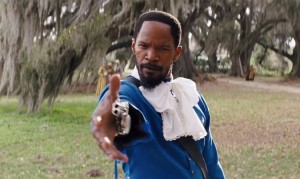
NOTE: I’ve also written a piece for CNN.com covering most of the same ground here. If you want to compare or contrast, click here.
IMMEDIATE REACTION: If loving Django Unchained is wrong, then I don’t…well, let’s see. What is it exactly I don’t want to be? That is the question. One of many…
Let’s tip off with a question that may not have an immediate or easy answer: Which movie better empowers black audiences? An historic drama, more or less factually-based, in which white men argue over and eventually move towards ending slavery – if not racism? Or an historic fantasy, rife with vulgarity, anachronism and impropriety, in which a freed black slave lays waste to every white southerner impeding his reunion with his wife — and gets away with it?
I am not asking which is the better movie, Lincoln or Django Unchained. Both have their problems. But it’s possible, despite their flaws, to enjoy them both for what they are, while accepting what they are not. I did not expect Lincoln to be much different from any other Steven Spielberg movie (though, until the ending, it is) and I certainly didn’t expect Django to be anything other than a Quentin Tarantino movie (and it is, only more so, for better and worse.)
For whatever it’s worth, my issues with the movie have more to do with craft than substance. I think Django talks too much, even for a Tarantino movie; and I also think that many of its scenes go on for too long, almost as if the movie’s afraid to let go of whatever effect it thinks it’s making with those people in the dark. It occurs to me, as well, that Tarantino’s been ripping himself off too cavalierly. I watch the set-pieces of wholesale slaughter and think, if I didn’t know any better, I’d swear I was watching Kill Bill Vol. 1 and the Japanese have been turned into southern whites.
Still, I couldn’t help myself. I laughed at Don Johnson and his night-riding stooges throwing hissy fits over whether to keep their masks on. I was almost touched by the slave girl’s impromptu bon mot aimed at Django’s baby-blue fop’s outfit. “You’re free…and you want to dress like that?” I didn’t buy any of it. But I was into it. And part of me hates myself for it. But I’m not sorry I saw it.
All right, then. So what am I asking? Get comfortable. I’m going to digress.
Back in 2006, I reviewed Blood Diamond for Newsday, giving it the two stars I routinely doled out to generic Hollywood mediocrity. I acknowledged the importance of the movie’s theme, which was the exploitation and wholesale murder of black Africans for the sake of the pink diamond trade. But I found myself chafing over the way this movie, along with so many of its kind, depicted its dark-skinned characters “as wholesale cannon fodder, doomed-but-noble ciphers or sneering bloodthirsty sociopaths.” I also lamented how the always-exemplary Djimon Hounsou, cast as a fisherman from Sierra Leone searching for his captured son, was used mainly as a vehicle through which the morally indolent white mercenary played by Leonardo DiCaprio Finds His Humanity (or something like that). At one point, Hounsou’s character even wonders aloud whether his people’s black skin constitutes some sort of curse “and [that] we were better off when the white man ruled.” No one, certainly not DiCaprio’s character, bothers to engage, much less contradict, this query. And, of the movie’s critics, I recall only the Nation’s Stuart Klawans calling the movie on this odious hogwash.
This is how I ended my own review:
“I suppose we should be grateful that there have been so many commercial features in recent years (“Hotel Rwanda,” “The Constant Gardener” among them) that pay attention to Africa’s woes. But even the best of them seem to writhe from hopelessness to despair and back again. Maybe what the continent needs are some empowering pulp myths far beyond the hoary model of Tarzan. A good start would be to cast Hounsou as the lead in a movie about the Black Panther, Marvel Comics’ first superhero-of-color. An African king who’s both a world-class physicist and a supreme martial artist may not be plausible, but he could broaden moviegoers’ sense of what’s possible.” (ITALICS ADDED).
Some readers, at least those who got that far, seemed to have a problem with this notion. One used the word, “infantile” (which over time I’ve accepted as a back-handed compliment). But what is so childish about African American audiences wanting their on-screen counterparts (or surrogates) to be more than merely victims? I believe even white audiences get excited when conventional expectations, especially in race and cultural matters, are upended, if not exactly transcended.
This is the excitement I hear from people after they’d just seen Django Unchained. I doubt whether any of these viewers bought their tickets with the expectation of seeing some historically faithful saga of antebellum life, and neither did I. They were buying a comic book. Many people have a grievance against the very notion of comic books, but I don’t. I understand that comic books as a medium are limited in what they offer their clientele. So are the movies, especially those who cruise the multiplexes for loose coin. Expect a movie or a comic book to explain everything about anything and all you earn is surplus sadness in your life that you don’t really need.
Even with the narrowest expectations about historical veracity, however, things get complicated when the subject matter is American slavery, European Holocaust or any number of similar assaults upon humanity. Hence the reaction to Django, after less than a month of swimming in the mainstream, ranges from sheer exhilaration to outright hostility, with the usual gradations in between.
Much of the resentment seems aimed exclusively towards Tarantino himself; a visceral dislike which I think has a lot to do with Spike Lee’s outright refusal to see the movie, tossing grenades at it all the way. Ishmael Reed, writing in the Wall Street Journal, believes Tarantino shows willful, if not willed ignorance of history, both American and cinematic. He writes: “To compare this movie to a spaghetti western and a blaxploitation film is an insult to both genres. It’s a Tarantino home movie with all the racist licks of his other movies.” Reed aimed this laser shot at the Oscar-nominated actor who plays the treacherous “house slave”: “Samuel L. Jackson…plays himself.”
I doubt Jackson felt the blow. He has, in fact, further provoked the movie’s antagonists by running straight at an interviewer asking about the movie’s prolific use of the “N-word,” refusing to answer the question unless the reporter, who is white, actually says the dread epithet aloud. (He didn’t.)
Though I disagree with Reed’s conclusions, I think everyone who saw Django should read his piece for its flying shrapnel of loose insight and, most important, its disclosure of what has always been a relevant source of disquiet: The debate over whether white artists have the right to tell any part of the black American story – which, as Reed writes, is as old as Uncle Tom’s Cabin.
It is also as recent as 1967 when the white southern novelist William Styron published The Confessions of Nat Turner, a Pulitzer Prize-winning novel told in the first-person voice of the brilliant-but-doomed leader of an 1831 slave rebellion. The outcry from African American novelists was so intense that a collection of essays, William Styron’s Nat Turner: Ten Black Writers Respond was published a year later. When I was a credulous, anxious-to-please teenager, I was so in thrall to the authority exerted by those black writers that for decades afterwards, I refused to even go near Styron’s book.
I still haven’t read it. But I plan to, because I now believe that James Baldwin, a friend of Styron who was one of the few African American authors speaking out on the book’s behalf, had the right take from the beginning: “I will not tell another writer what to write. If you don’t like their alternative, write yours.”
It’s still sound advice – and in the intervening years, black authors have taken it. Indeed, if anyone’s earned the right to rail at Django, it’s Ishmael Reed since, unlike Spike Lee, he’s actually created his own antebellum thriller that’s as funny, provocative and calculatedly anachronistic as Tarantino’s. I can almost hear Reed erupting with outrage over the sheer notion of my comparing Django with his 1976 book, Flight to Canada. But as I insisted to friends and fellow readers at the time (and continue to do so), even with all its musical-comedy interludes, burlesque elements and television cameras, Reed’s shrewd take on the slave-narrative genre had more trenchant, telling and useful things to say about the Peculiar Institution than Alex Haley’s Roots, which was ascending, that same year, to the rare stature of pop-cultural phenomenon. When Haley’s book became a television mini-series, it affected America’s racial attitudes as nothing of its literary kind since…Uncle Tom’s Cabin. No one’s bothered to do anything with cinematic Flight to Canada. Or, for that matter, with Charles Johnson’s Oxherding Tale and Middle Passage, two other antebellum satiric adventures written by an award-winning black author.
In 1987, there was Toni Morrison’s Beloved, which did get adapted for the big screen eleven years later by Jonathan Demme. But even with Oprah Winfrey’s imprimatur as producer and co-star, the movie earned about $26,000,000, roughly half of its $50,000,000 budget. And while all I have is anecdotal evidence, I remember many of my African American relatives and friends who told me they were not going to see Beloved, no matter how good it was or who was in it, because they simply did not want to watch a movie about slavery, or its legacy.
This reluctance to engage with the subject of slavery is duly noted in Jelani Cobb’s ruminative take on Django:
“In my sixteen years of teaching African-American history, one sadly common theme has been the number of black students who shy away from courses dealing with slavery out of shame that slaves never fought back. It seems almost pedantic to point out that slavery was nothing like this. The slaveholding class existed in a state of constant paranoia about slave rebellions, escapes, and a litany of more subtle attempts to undermine the institution. Nearly two hundred thousand black men, most of them former slaves, enlisted in the Union Army in order to accomplish en masse precisely what Django attempts to do alone: risk death in order to free those whom they loved. Tarantino’s attempt to craft a hero who stands apart from the other men—black and white—of his time is not a riff on history, it’s a riff on the mythology we’ve mistaken for history. Were the film aware of that distinction, Django would be far less troubling—but it would also be far less resonant. The alternate history is found not in the story of vengeful ex-slave but in the idea that he could be the only one.”
Cobb’s ambivalence approaches my own point-of-view, even though I still liked the movie better than he did. As with other critics, he laments Django’s lapse into revenge-movie mode. I lament the fact that almost EVERY big-studio film is built for revenge, even romantic comedies. (What, after all, is Skyfall but the mother-of-all-revenge-fantasies with different agendas for vengeance overlapping and colliding into each other like a freeway pile-up?) No matter. If Django Unchained did nothing else but arouse re-examination of “the mythology we’ve mistaken for history,” then all the trouble and fuss it’s caused will have been worth it.







































